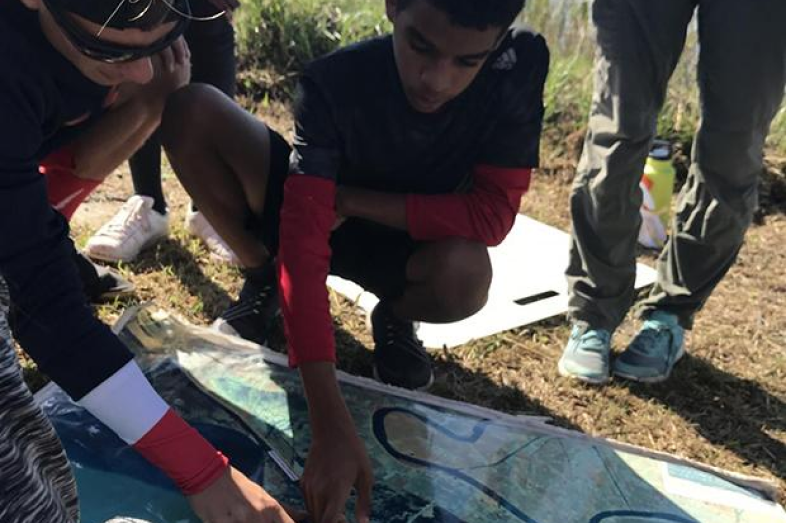
To Teach Civic Engagement, Put Students Into Action, Advocates Say
Sunny Dawn Summers and her class of high school students talked through the process of harvesting, shucking, and selling oysters.

Sunny Dawn Summers and her class of high school students talked through the process of harvesting, shucking, and selling oysters.
With their bodies submerged in the shallow bayou and their heads bobbing just above the water, Sunny Dawn Summers and her class of high school students talked through the process of harvesting, shucking, and selling oysters.
Just miles from restaurants in New Orleans’ famed French Quarter, the students pondered the costs of labor, boat maintenance, and shipping that get an oyster from the muddy bayou floor to the dinner plate.
Summers, a former teacher, recounted the experience at a recent Education Writers Association seminar in New Orleans where journalists explored the role of schools in promoting character and civic engagement.
“We are doing all core four (subjects), plus we are adding in civics,” Summers said of the activity. “The kids are like, ‘This isn’t school,’ But yeah guys, this is school and this is what it means to do school in a way that really impacts the community.”
Beyond just hands-on learning and field trips, civic education should include a level of intentionality that allows students to see the relevancy of connecting with their community, according to speakers on a panel titled “Education for Democracy: Promoting Civic Engagement.”
Joining Summers were Abby Kiesa, of the Center for Information & Research on Civic Learning and Engagement (CIRCLE), and Robert Pondiscio of the Thomas B. Fordham Institute.
“Increasingly, we are seeing that the civic themes and civic skills and civic content can be embedded across subject areas,” Kiesa said.
But, Kiesa added, “It’s much more than the curriculum. Teachers have to be confident in teaching that curriculum and facilitating those activities, and the school leadership has to promote those high-quality practice and support the teachers.”
Reporters should pay attention to how supported educators feel in teaching civic engagement, Kiesa argued, even if it takes the focus away from an end-of-year test.
She also said reporters should look for how efforts inside school are leading to connections in the larger community. Are class projects leading to a response from civic leaders? Does a focus on civic engagement lead to an increase in voter registration rates for 18-year-olds?
Civic engagement education should also help students expand their opportunities beyond high school, Kiesa added.
“When we see young people working on issues they care about,” she said, “then we see them making connections to employment, to broader networks.”
While civic engagement education can take the attention off teaching students to pass an exam, Pondiscio cautioned that reporters should not overlook how effective these programs are at helping student pass tests and gain specific knowledge.
“Do not indulge the false dichotomy of skills versus knowledge,” said Pondiscio, who also is a senior adviser (and former teacher) at Democracy Prep Public Schools in New York City. “A lot of us who do civic education are guilty of setting those two ideas against one another.”
Pondiscio said he supports a requirement for high school students to pass the U.S. citizenship test, believing concrete knowledge that can be captured on a test still has value.
“As a reporter, ask yourself, would you hire someone in your newsroom who couldn’t tell you what the three branches of government were? Or, (if someone) couldn’t tell you how many Supreme Court justices there were?” Pondiscio said.
Summers agreed that concrete knowledge is important, but encouraged reporters to focus on how effective schools are at making civic engagement relevant for students.
“I would love for kids to be able to take and pass those types of tests and I think that they would if it was relevant to what they care about,” Summers said. “How do we build that relevance into their day-to-day existence? You are a poor kid from an urban center, can you change policy? Does it matter to you?”
Using real-world problems to teach students is at the heart of New Harmony High, the charter school Summers is working to open later this year. (The school received a $10 million grant from the XQ Super Schools Project.)
In New Orleans, where climate change has led to the erosion of land around the Mississippi River Delta, New Harmony High plans to focus on coastal restoration and preservation.
Students will participate in hands-on lessons that not only educate, but also inspire community engagement, Summers said.
Like all other public high schools, students at New Harmony High will be required to master core content for graduation and parents will expect students to be set up for college or a career. But, according to Summers, the real value of the new school will be the future impact its students have on their community.
“We always say we’ll be successful if our students’ grandchildren can still live [in New Orleans],” Summers said.
Your post will be on the website shortly.
We will get back to you shortly